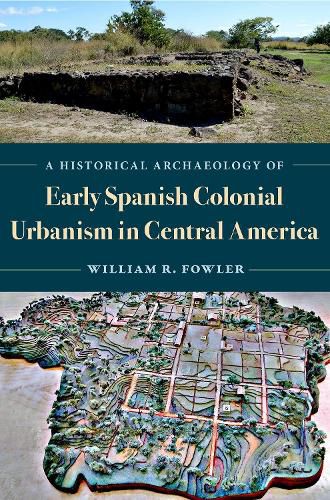Readings Newsletter
Become a Readings Member to make your shopping experience even easier.
Sign in or sign up for free!
You’re not far away from qualifying for FREE standard shipping within Australia
You’ve qualified for FREE standard shipping within Australia
The cart is loading…






This title is printed to order. This book may have been self-published. If so, we cannot guarantee the quality of the content. In the main most books will have gone through the editing process however some may not. We therefore suggest that you be aware of this before ordering this book. If in doubt check either the author or publisher’s details as we are unable to accept any returns unless they are faulty. Please contact us if you have any questions.
In this milestone work, William Fowler uses archaeology, history, and social theory to show that the establishment of cities was essential to Spanish colonialism. Fowler draws upon decades of archaeological research on the landscape, built environment, and architecture of Ciudad Vieja, a sixteenth-century site located in present-day El Salvador and the best-preserved Spanish colonial city in Latin America.Fowler compares Ciudad Vieja to other urban sites in the region and to the tradition of urbanism in early modern Spain to determine how the Spanish grid-plan layout was modified and implemented in the Americas. Using extensive archival material, Fowler describes how this layout reflected and perpetuated power structures that benefitted the Spanish although the city’s Indigenous population was greater in number. Fowler analyzes recorded interactions between colonists, Indigenous peoples, and enslaved Africans to demonstrate the ways the cityscape affected the relationships among individuals and cultural groups.
Offering an unparalleled view into a critical moment in Latin American history, this book offers new ways of looking at urbanism and colonialism as intertwined forces in the emergence of the early modern world.
$9.00 standard shipping within Australia
FREE standard shipping within Australia for orders over $100.00
Express & International shipping calculated at checkout
This title is printed to order. This book may have been self-published. If so, we cannot guarantee the quality of the content. In the main most books will have gone through the editing process however some may not. We therefore suggest that you be aware of this before ordering this book. If in doubt check either the author or publisher’s details as we are unable to accept any returns unless they are faulty. Please contact us if you have any questions.
In this milestone work, William Fowler uses archaeology, history, and social theory to show that the establishment of cities was essential to Spanish colonialism. Fowler draws upon decades of archaeological research on the landscape, built environment, and architecture of Ciudad Vieja, a sixteenth-century site located in present-day El Salvador and the best-preserved Spanish colonial city in Latin America.Fowler compares Ciudad Vieja to other urban sites in the region and to the tradition of urbanism in early modern Spain to determine how the Spanish grid-plan layout was modified and implemented in the Americas. Using extensive archival material, Fowler describes how this layout reflected and perpetuated power structures that benefitted the Spanish although the city’s Indigenous population was greater in number. Fowler analyzes recorded interactions between colonists, Indigenous peoples, and enslaved Africans to demonstrate the ways the cityscape affected the relationships among individuals and cultural groups.
Offering an unparalleled view into a critical moment in Latin American history, this book offers new ways of looking at urbanism and colonialism as intertwined forces in the emergence of the early modern world.